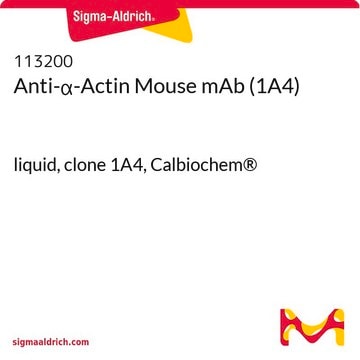MABT823
Anti-alpha-Actin Antibody, Cardiac Muscle (ACTC1) Antibody
mouse monoclonal, 22D3
Sinónimos:
Actin, alpha cardiac muscle 1, Alpha-cardiac actin
Seleccione un Tamaño
296,00 €
Seleccione un Tamaño
About This Item
296,00 €
Productos recomendados
Nombre del producto
Anti-alpha-Actin Antibody, Cardiac Muscle Antibody, clone 22D3, clone 22D3, from mouse
origen biológico
mouse
Nivel de calidad
forma del anticuerpo
purified immunoglobulin
tipo de anticuerpo
primary antibodies
clon
22D3, monoclonal
reactividad de especies
rat, human, goat, rabbit
reactividad de especies (predicha por homología)
porcine (based on 100% sequence homology), mouse (based on 100% sequence homology)
técnicas
flow cytometry: suitable
immunocytochemistry: suitable
immunofluorescence: suitable
western blot: suitable
isotipo
IgG1κ
Nº de acceso NCBI
Nº de acceso UniProt
Condiciones de envío
ambient
modificación del objetivo postraduccional
unmodified
Información sobre el gen
human ... ACTC1(70)
Categorías relacionadas
Descripción general
Especificidad
Inmunógeno
Aplicación
Immunofluorescence Analysis: A representative lot immunostained cardiomyocytes in human left ventricular endocardial biopsies, rabbit left ventricular myocardium, as well as in goat atrial myocardium frozen tissue sections by fluorescent immunohistochemistry (Driesen, R.B., et al. (2009). J. Cell. Mol. Med. 13(5):896-908).
Western Blotting Analysis: A representative lot specifically detected alpha-cardiac actin in rat myocardium homogenate with no cross-reactivity toward - or -smooth muscle actin in rat aorta and chicken gizzard homogenates, cytoplasmic - or -actin in human platelet lysate, nor -skeletal actin in rat skeletal muscle homogenate (Driesen, R.B., et al. (2009). J. Cell. Mol. Med. 13(5):896-908).
Cell Structure
Calidad
Flow Cytometry Analysis: 2 µL of this antibody detected alpha-cardiac actin in one million 4% paraformaldehyde-fixed, 0.2% Triton X-100-permeabilzed HeLa cells.
Descripción de destino
Forma física
Almacenamiento y estabilidad
Otras notas
Cláusula de descargo de responsabilidad
¿No encuentra el producto adecuado?
Pruebe nuestro Herramienta de selección de productos.
Código de clase de almacenamiento
12 - Non Combustible Liquids
Clase de riesgo para el agua (WGK)
WGK 1
Punto de inflamabilidad (°F)
Not applicable
Punto de inflamabilidad (°C)
Not applicable
Certificados de análisis (COA)
Busque Certificados de análisis (COA) introduciendo el número de lote del producto. Los números de lote se encuentran en la etiqueta del producto después de las palabras «Lot» o «Batch»
¿Ya tiene este producto?
Encuentre la documentación para los productos que ha comprado recientemente en la Biblioteca de documentos.
Filtros activos
Nuestro equipo de científicos tiene experiencia en todas las áreas de investigación: Ciencias de la vida, Ciencia de los materiales, Síntesis química, Cromatografía, Analítica y muchas otras.
Póngase en contacto con el Servicio técnico








